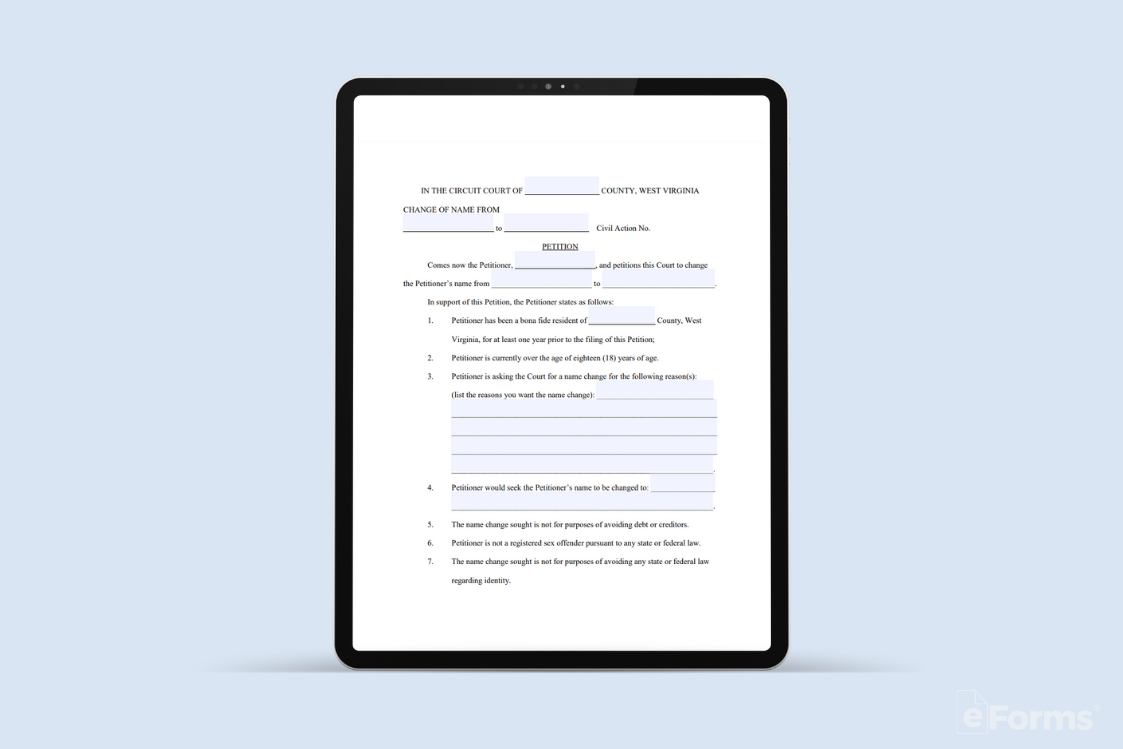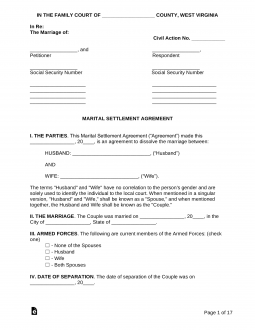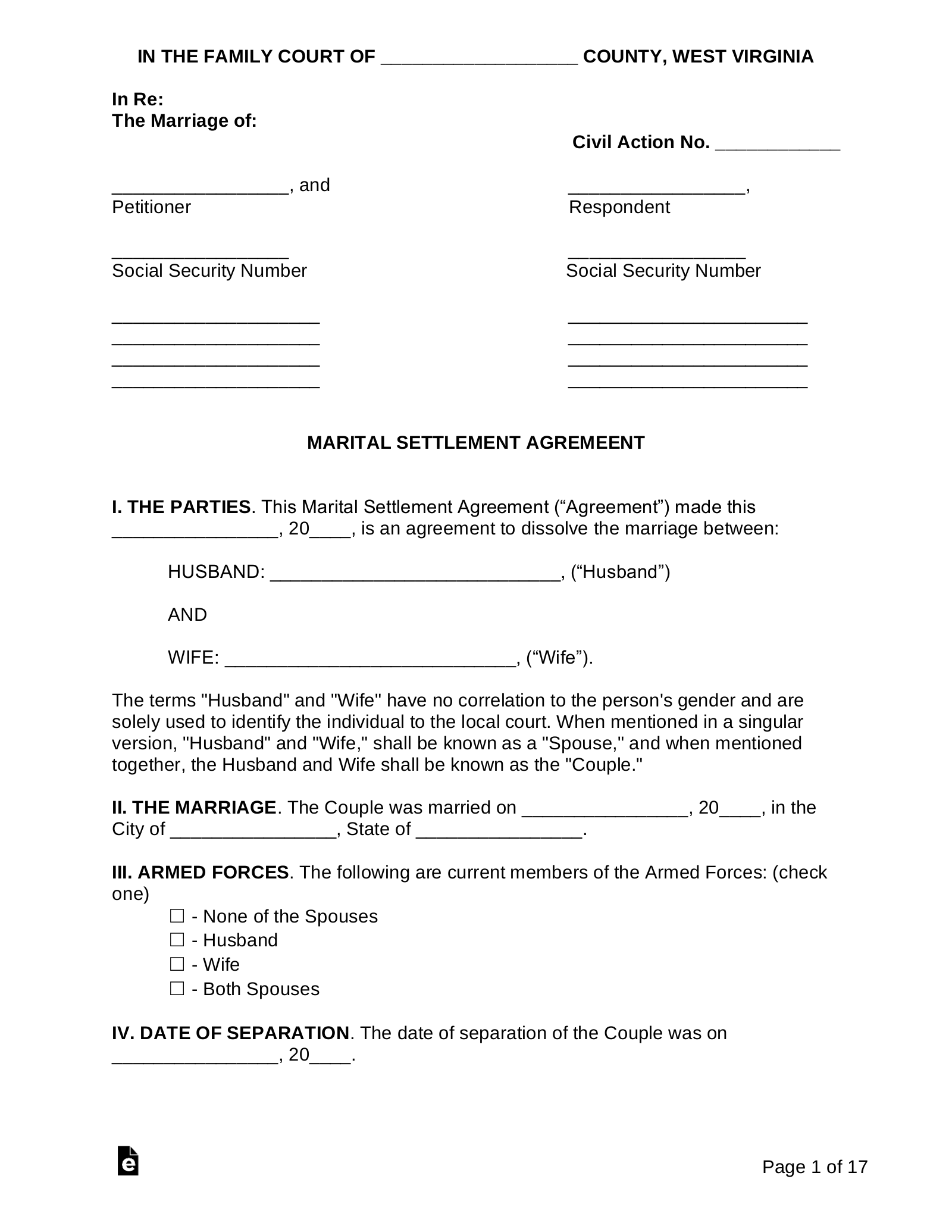Updated February 26, 2024
A West Virginia marital settlement agreement is a document used by divorcing spouses to relay to the court that they are in agreement regarding all divorce terms. In West Virginia, the courts will adhere to the settlement agreement’s requests as they apply to the division of assets and debt between parties. Without the presence of such a contract, the court will be forced to distribute marital property as they deem just and fair. A completed marital settlement agreement (or separation agreement) can also include child custody, child support, and alimony.
Table of Contents |
Divorce Laws
Statutes – Chapter 48 (Domestic Relations)
Alimony (Ch. 48, Article 8 (Spousal Support)) – In cases where there is no settlement agreement in place, the court may award either party alimony, also known as spousal support, in consideration of the following determining factors as defined in §48-6-301:
- Length of the marriage;
- Duration of cohabitation during the marriage;
- Each party’s income;
- The income potential of each party;
- The distribution of marital property;
- Age and condition of both parties;
- Educational qualifications;
- Whether either party has sacrificed income-generating opportunities during the marriage;
- Standard of living while married;
- The likelihood that the spouse seeking alimony will increase their income-earning abilities within a reasonable amount of time;
- The financial support of either party to contribute to the earning capacity of the other;
- Cost of the education of the receiving spouse;
- Cost of educating minor children;
- Cost of health care to receiving spouse and minor children;
- Tax consequences;
- The duties of the custodian of minor children affecting their ability to generate income;
- Each party’s financial needs;
- The legal responsibilities of each party;
- The mental or physical disabilities of any minor or adult child; and
- Any other factor as deemed necessary by the court.
Child Support (Ch.48, Article 11 (Support of Children)) – When calculating the amount of support that either parent must provide their child, the court will look to the West Virginia table of monthly basic child support obligations (§ 48-13-301). They may choose to deviate from the table in consideration of the following possible grounds to disregard the formula:
- The special needs of a minor or adult child who is physically or mentally disabled;
- Educational needs of the child;
- The family has more than six (6) minor children;
- Visitation costs associated with traveling long distances;
- A minor child resides with a third (3rd) party;
- Obliger owes support to another child(ren);
- The reliability of the obliger’s current income; and
- If the total of the spousal and child support requirements leave the obliger below the poverty line.
Division of Property (Ch. 48, Article 7 (Equitable Distribution of Property)) – In the absence of a marital settlement agreement, the court will presume that all marital property should be divided equally between the spouses. Because West Virginia is an equitable distribution state and does not adhere to community property law, the court may alter the distribution of marital property in consideration of the following:
- The degree to which each party has financially contributed to the marital property;
- The degree to which each party has contributed to the marital property by non-monetary means;
- The degree to which either party’s efforts in their contribution to the marriage decreased their ability to earn income or increased the ability for the other spouse to earn income; and
- The degree to which either party depreciated the value of the marital property during the marriage.
Grounds for Divorce (§48-5-201 through §48-5-209) – In West Virginia, a couple can file for divorce on the following grounds:
- Irreconcilable differences
- Voluntary separation of at least one (1) year
- Cruel or inhuman treatment
- Adultery
- Conviction of crime
- Insanity
- Habitual drunkenness or drug addiction
- Desertion
- Child abuse/neglect
Interim Support (§48-5-502) – The court may order either party to pay the other temporary support for the duration of the proceedings either in installments or in a lump sum.
Residency (§48-5-105) – The couple may divorce in West Virginia if they were married in the state and one (1) of the parties is currently a resident. If the couple was married outside the state, one (1) of the parties must have been a resident for at least one (1) year.
Separation (§48-5-202) – Either party may file for divorce on the grounds of separation providing that the couple has lived apart without interruption for a period of one (1) year.
Divorce Forms
- Where to File – Circuit Clerk’s Office
- Filing Fee – $135
- How Long Does it Take? – 30 to 90 days (source: 3stepdivorce.com)
Divorce with No Children:
- Petition for Divorce (SCA-FC-101)
- Petitioner’s Civil Case Information Statement (SCA-FC-103)
- Vital Statistics Form (SCA-FC-104)
- Financial Statement (SCA-FC-106)
- Acceptance of Service (SCA-FC-105)
- Answer to Divorce Petition (SCA-FC-108)
- Affidavit of Unknown or Out of State Residency (SCA-FC-110)
- Order of Publication (SCA-FC-111)
- BCSE Application and Income Withholding Form (SCA-FC-113)
- Scheduling Order
- Notice of Hearing (IG-FORM02A)
- Final Order (signed by judge)
Divorce With Children:
- Petition for Divorce (SCA-FC-101)
- Petitioner’s Civil Case Information Statement (SCA-FC-103)
- Vital Statistics Form (SCA-FC-104)
- Financial Statement (SCA-FC-106)
- Acceptance of Service (SCA-FC-105)
- Answer to Divorce Petition (SCA-FC-108)
- Affidavit of Unknown or Out of State Residency (SCA-FC-110)
- Order of Publication (SCA-FC-111)
- BCSE Application and Income Withholding Form (SCA-FC-113)
- Scheduling Order
- Notice of Hearing (IG-FORM02A)
- Family Court Parenting Plan (SCA-FC-121)
- Parenting Class Completion Certificate
- Worksheet for Individual Proposed Parenting Plan (SCA-FC-128)
- Final Order (signed by judge)
How to File for Divorce in West Virginia (9 steps)
- Complete Divorce Paperwork
- File Petition and Other Documents
- Serve Respondent
- Respondent Answer
- Parenting Class and Parenting Plan (if applicable)
- Marital Settlement Agreement
- Case Management Conference/Hearing
- Final Hearing
- Name Change
1. Complete Divorce Paperwork
 West Virginia divorces begin with the completion of the petition and accompanying paperwork. The petitioner, the individual initiating and filing the divorce, will be required to download, copy, and complete the following documents to prepare for filing:
West Virginia divorces begin with the completion of the petition and accompanying paperwork. The petitioner, the individual initiating and filing the divorce, will be required to download, copy, and complete the following documents to prepare for filing:
- Petition for Divorce (SCA-FC-101)
- This is the document that starts the divorce case. It will contain the grounds for divorce, as well as the petitioner’s requests for child support, custody, property division, and alimony. Three (3) copies should be made.
- Petitioner’s Civil Case Information Statement (SCA-FC-103) (three copies)
- Provides vital personal information of both the respondent and the petitioner and lists any minor children involved in the case.
- Financial Statement (SCA-FC-106)
- Each spouse will complete their own financial statement. The statement will list their respective assets, liabilities, and income. If the spouses are parents of minor children, they must each provide the following:
- Copies of the petitioner’s three (3) most recent pay stubs;
- Copies of both spouses’ tax returns from the past two years, copies of Form W-2 for those years, and a Form W-2 for the most recent year when it was available (even if their tax return has yet to be filed);
- Copy of current financial statement (if self-employed); and
- Invoices and receipts reflecting the costs of child care expenses.
- Each spouse will complete their own financial statement. The statement will list their respective assets, liabilities, and income. If the spouses are parents of minor children, they must each provide the following:
- Vital Statistics Form (SCA-FC-104)
- Used to update the Division of Vital Statistics of the petition.
- BCSE Application and Income Withholding Form (SCA-FC-113) (if applicable)
- If the couple has minor children together or alimony (spousal support) is being requested, both parties must fill out a copy of this form.
2. File Petition and Other Documents
 With the forms completed, signed, and notarized, the petitioner can file them with the Circuit Clerk’s Office in the county where the respondent lives, the county the petitioner lives, or the county in which they last lived together (this is dependent on whether the respondent lives in West Virginia or not). The filer must pay the fee for filing the Divorce Petition ($15) and any additional costs requested by the deputy clerk. If the petitioner is a parent, they will also be required to pay the Parent Education Fee. These fees can be waived with an affidavit completed at the clerk’s office.
With the forms completed, signed, and notarized, the petitioner can file them with the Circuit Clerk’s Office in the county where the respondent lives, the county the petitioner lives, or the county in which they last lived together (this is dependent on whether the respondent lives in West Virginia or not). The filer must pay the fee for filing the Divorce Petition ($15) and any additional costs requested by the deputy clerk. If the petitioner is a parent, they will also be required to pay the Parent Education Fee. These fees can be waived with an affidavit completed at the clerk’s office.
3. Serve Respondent
The respondent must be served with all forms filed with the clerk’s office as well as a completed summons (provided by deputy clerk). The petitioner will have to arrange for this service themselves, and can choose one of the following options to deliver the papers:
- Acceptance of Service – The petitioner delivers the papers to the respondent and has them sign an Acceptance of Service (SCA-FC-105) before a notary public. The petitioner will then file the form with the clerk’s office.
- Personal Service by Sheriff’s Department – Twenty-five dollars ($25) is paid at the clerk’s office and directions to the respondent’s address are provided. The sheriff’s department will then arrange to have the papers served on the respondent.
- Personal Service by Process Server – A process server eighteen (18) years old or older is hired and delivers the papers to the respondent’s address. Once served, the server completes an affidavit and the affidavit is filed with the court.
- Service by Certified Mail – A twenty-dollar ($20) fee is paid at the clerk’s office and the deputy clerk will have the papers delivered by certified mail with return receipt requested. The respondent must personally accept and sign the receipt, and the return receipt postcard will be received by the court to be filed.
- Service by Publication – This is used when the respondent cannot be located or they live out of state and will not return receipt for service. The service by publication makes it difficult for the court to award child support or alimony, and it shouldn’t be used if the only grounds for divorce are irreconcilable differences. In this case, the petitioner will have to complete the Affidavit of Unknown or Out of State Residency (SCA-FC-110) and bring it to the clerk’s office. The deputy clerk will complete an Order of Publication (SCA-FC-111) to be taken to a newspaper in the respondent’s county where a notice will be posted twice. The court must receive an affidavit of publication from the newspaper as proof of service.
4. Respondent Answer
5. Parenting Class and Parenting Plan (if applicable)
6. Marital Settlement Agreement
7. Case Management Conference/Hearing
9. Name Change
 If either party requested to resume their previous name in either the petition or the answer to the petition, the name change will be reflected in a court-issued certificate of divorce. This proof can in turn be used to update personal identification and accounts. More information on the West Virginia name change process can be found here.
If either party requested to resume their previous name in either the petition or the answer to the petition, the name change will be reflected in a court-issued certificate of divorce. This proof can in turn be used to update personal identification and accounts. More information on the West Virginia name change process can be found here.


